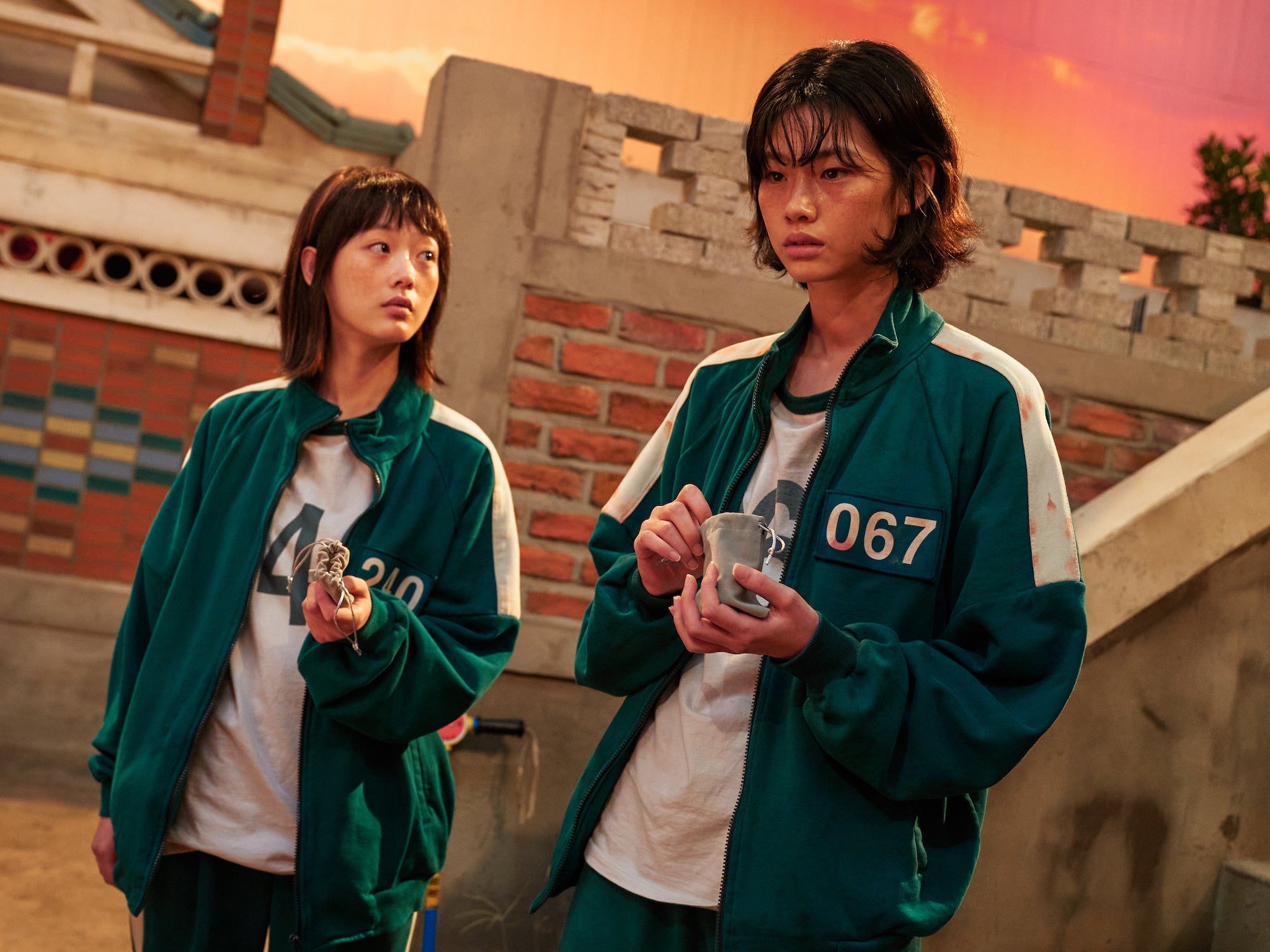Tenta-killed it: Squid Game and the rise of the ‘deadly game’ TV show
The Korean Netflix smash and its Japanese precursor ‘Alice in Borderland’ are proof that there’s still a huge appetite for shows about human bloodsport. Annabel Nugent examines their success and looks at why their English-language counterparts aren’t up to scratch


Your support helps us to tell the story
From reproductive rights to climate change to Big Tech, The Independent is on the ground when the story is developing. Whether it's investigating the financials of Elon Musk's pro-Trump PAC or producing our latest documentary, 'The A Word', which shines a light on the American women fighting for reproductive rights, we know how important it is to parse out the facts from the messaging.
At such a critical moment in US history, we need reporters on the ground. Your donation allows us to keep sending journalists to speak to both sides of the story.
The Independent is trusted by Americans across the entire political spectrum. And unlike many other quality news outlets, we choose not to lock Americans out of our reporting and analysis with paywalls. We believe quality journalism should be available to everyone, paid for by those who can afford it.
Your support makes all the difference.Squid Game. Two words you never expected to hear in the same sentence. Chance moments of calamari-based amusement aside, the phrase – for English-speaking audiences at least – is nonsensical. Or it was up until a week ago. Now, it’s the title of Netflix’s latest hit out of the park.
Within four days of its release on 19 September, Squid Game propelled itself to No 1 in Netflix’s Top 10. Today, the show’s deceptively cheerful-looking thumbnail sits comfortably in pole position, where it is likely to remain tomorrow and the day after that.
The show’s popularity is so vast that it has even boosted South Korean media stocks, with 95 per cent of viewers based outside its home country. There are make-up tutorials on TikTok devoted to getting that Squid Game “look”. Fan-made videos about the series have racked up 11 billion views and counting. According to Netflix CEO Ted Sarandos, there’s a good chance that it will become the streamer’s “biggest show ever”. It’s hard to know exactly what that means, as the company infamously uses secret metrics, but it’s nevertheless a big shout given the heavyweight competition. Bridgerton, Stranger Things and The Witcher must be shaking in their boots.
Squid Game is the first South Korean series to summit the streamer’s global chart and is proof that the “deadly game” genre isn’t going anywhere fast. The series belongs to the same tradition of gory sensationalism that includes the 2000 cult classic Battle Royale, Suzanne Collins’s YA hit The Hunger Games, Stephen King’s The Running Man as well as its 1987 film adaptation, the 1932 classic The Most Dangerous Game, and manga depictions such as Liar Game. But whereas recent English-language iterations of the genre have floundered, the new takes on the old trope coming out of Korea and Japan are thriving.
For the uninitiated, Squid Game takes place in present-day South Korea. Our main man is Seong Gi-hun (Lee Jung-jae), a gambling addict nearing 50 who owes money all over town. He has a lot on his mind: a disappointed daughter, a sickly mother and a menacing loan shark to whom he has signed away the physical rights to his organs. (They’ll take his kidneys first, eyes next.) There’s also the all-important question of which horse to back next. Increasingly desperate, Gi-hun reluctantly agrees when he is approached by a handsome stranger on a subway platform who invites him to participate in a game with a hefty cash prize: 45.6bn won (about £29m).
After he accepts, Gi-hun later wakes up in a facility that resembles an enormous children’s playhouse. Pastel colours are everywhere like the Easter bunny vomited on the walls. There are hundreds of others like Gi-hun who wear identical tracksuits and occupy the multi-level bunk beds next to his. Meanwhile, a group of guards – wearing a mask and boiler suit combo seemingly inspired by Daft Punk and Netflix’s other foreign-language hit Money Heist – patrol the area and explain the game rules. It’s simple enough: win all six rounds and you get the money; lose any and you’ll be eliminated.
The first round – a twist on the schoolyard game red light, green light (commonly known as grandma’s footsteps in the UK) – ends with a pile of dead bodies much larger than the number of shell-shocked contestants who survive them. Blood pools on the floor while Frank Sinatra croons the lyrics to “Fly Me to the Moon” overhead. These are no ordinary kids’ games. Of course, you already knew that. Desperate contestants, masked enforcers, creepy setup – the deadly-game genre is familiar enough that viewers can spot it a mile away.
But there is one show to which it bears a striking resemblance. For every 20 posts about Squid Game on Twitter, there is one directing its fans to Alice in Borderland – a Japanese thriller from last year that mostly flew under the radar. The series anticipated Squid Game in many ways and, in some, bettered it. There are differences between the two: Alice in Borderland is more sci-fi, for one thing. The series follows young gamer Ryohei Arisu (Kento Yamazaki) and his two friends who emerge from the subway one afternoon to find Tokyo inexplicably desolate. Night falls and colossal lights in the sky direct the trio to one of the metropolis’s many designated game centres where they find themselves – together with other clueless inhabitants of this new city – engaged in a game of life and death. If you’re successful, you receive a visa that lets you live for however many days it specifies until you must participate in another game to extend it. If you’re unsuccessful, you die.
While the worlds of Alice in Borderland and Squid Game are different, their stories – of relationships, treachery, betrayal, sacrifice – are one and the same. Both shows invest serious time in developing their characters. Lee Jung-jae is wonderful as Squid Game’s lead, playing the role with the physicality of a silent film star. The actor lurches into the show’s premise with aplomb; he is the one who sells it as a concept. It is not only him who bestows the series with its intensity and high-stakes, though. Of all the show’s ensemble cast, there is not a misstep between them. The characters, like those in Alice in Borderland, are considered and flawed in ways that are endearing instead of heavy handed. So much so that you are totally invested in whether they live or die.
The creators of Squid Game and Alice in Borderland demonstrate an equal command of action flicks as they do soap operas. The emotional nuances of extreme violence aren’t lost in these shows as they are in recent American releases of the same genre. Amazon Video’s dismal YA adaptation Panic is a prime example of a good-trope-gone-bad. The plot, a bit predictably, is this: high schoolers opt to take part in a top-secret tournament of dangerous tasks in exchange for cash. Heather (Olivia Welch) is one such teen in dire need of college tuition money. Beyond the trope’s function as a damning indictment of America’s higher education system, it doesn’t do much else.

If Panic is a solar system, the central conceit is its sun. Everything revolves around it: the characters (wobbly simulacra of real human beings) exist solely in service of the plot. For example, we’re supposed to believe that Heather and Natalia (Jessica Sula) are BFFs because they tell us so, and yet, across the show’s 10 episodes, there is nothing to back up the claim. Onscreen chemistry fizzles and romance is dead. The result is a zero-sum game with zero tension. And when you don’t care about any of the characters, who cares who dies? The same goes for other American exports of the same genre, including the 2015 dud Circle and the mildly entertaining Escape Room film series, the third of which was released earlier this summer. Perhaps it is their Hollywood gloss, which makes an already surreal concept entirely and irredeemably unbelievable.

Part of Squid Game’s success and Alice in Borderland’s brilliance can perhaps be attributed to the long line of excellent deadly-game-themed shows, films, manga, and novels that preceded them. Battle Royale is an obvious companion to both: based on a novel by Koushun Takami and directed by Kinji Fukasaku, the 2000 Japanese cult classic depicts a dystopia in which a tyrannical government controls its rebellious youth by annually selecting a ninth-grade class to be taken to a deserted island where they will kill each other until only one student survives (Suzanne Collins has denied all allegations of plagiarism, FYI). And again, the film’s central conceit and resulting violence – which is bloody, shocking and also, perversely, very fun – is a means to emotional ends. Keeping the fights as one-vs-one or two-vs-one makes the brutality of Battle Royale feel infinitely more personal.
The deadly game trope is appealing for obvious reasons. If anything is guaranteed in cinema, it’s an audience’s sadistic love of high-concept violence. But if the existence of shows such as Squid Game and Alice in Borderland alongside ones like Panic prove anything, it’s that they are definitely not all created equal.

Join our commenting forum
Join thought-provoking conversations, follow other Independent readers and see their replies
Comments